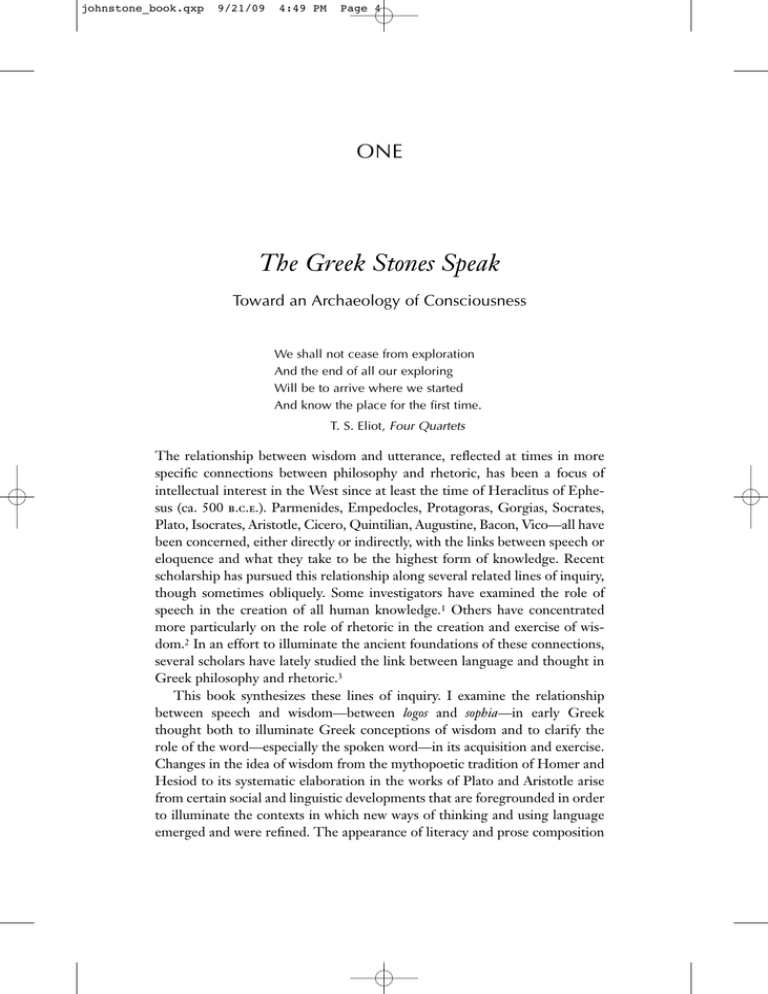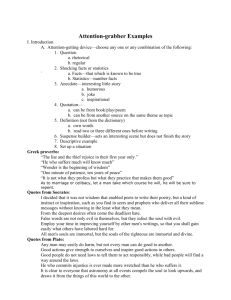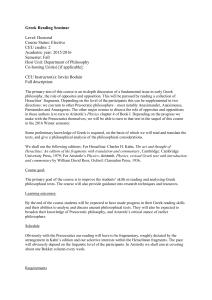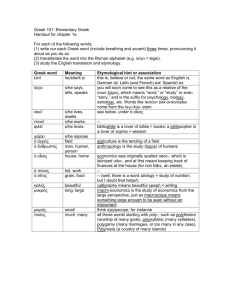The Greek Stones Speak ONE Toward an Archaeology of Consciousness
advertisement

johnstone_book.qxp 9/21/09 4:49 PM Page 4 ONE The Greek Stones Speak Toward an Archaeology of Consciousness We shall not cease from exploration And the end of all our exploring Will be to arrive where we started And know the place for the first time. T. S. Eliot, Four Quartets The relationship between wisdom and utterance, reflected at times in more specific connections between philosophy and rhetoric, has been a focus of intellectual interest in the West since at least the time of Heraclitus of Ephesus (ca. 500 b.c.e.). Parmenides, Empedocles, Protagoras, Gorgias, Socrates, Plato, Isocrates, Aristotle, Cicero, Quintilian, Augustine, Bacon, Vico—all have been concerned, either directly or indirectly, with the links between speech or eloquence and what they take to be the highest form of knowledge. Recent scholarship has pursued this relationship along several related lines of inquiry, though sometimes obliquely. Some investigators have examined the role of speech in the creation of all human knowledge.1 Others have concentrated more particularly on the role of rhetoric in the creation and exercise of wisdom.2 In an effort to illuminate the ancient foundations of these connections, several scholars have lately studied the link between language and thought in Greek philosophy and rhetoric.3 This book synthesizes these lines of inquiry. I examine the relationship between speech and wisdom—between logos and sophia—in early Greek thought both to illuminate Greek conceptions of wisdom and to clarify the role of the word—especially the spoken word—in its acquisition and exercise. Changes in the idea of wisdom from the mythopoetic tradition of Homer and Hesiod to its systematic elaboration in the works of Plato and Aristotle arise from certain social and linguistic developments that are foregrounded in order to illuminate the contexts in which new ways of thinking and using language emerged and were refined. The appearance of literacy and prose composition johnstone_book.qxp 9/21/09 4:49 PM Page 5 The Greek Stones Speak 5 during the archaic period, the expansion of trade along the Ionian coast during the seventh and sixth centuries b.c.e., the formation of the polis and the growing importance of public debate in Greek political life, the elaboration of a philosophical vocabulary and syntax by the Presocratics, the suzerainty of Athens over the Aegean city-states following the Persian Wars, the Sophists’ challenge to established custom and to the new philosophical doctrines, the challenges and excesses of democracy in Athens during the late fifth and the fourth centuries—all influenced intellectual developments throughout this brief period in Western history. These tracings are by no means a comprehensive history of or a commentary on Greek speculative thought. A number of such studies have been produced, beginning perhaps with Aristotle and continuing throughout the Western intellectual tradition. Rather, I follow the career of an idea, wisdom, from its roots in the mythic mind to its systematic articulation by the most prodigious intellect the Greek world produced. Similarly I am not reconstructing the historical development of rhetorical theory in ancient Greece.4 Instead, I examine the intellectual, conceptual, and linguistic milieu in which Greek rhetorical theory emerged, and I illuminate the ideas and terms with which the speaker’s art had to deal from the outset: wisdom, truth, knowledge, belief, prudence, justice, reason. These concepts have a history that predates that of rhetoric, and we can appreciate the development and substance of Greek rhetorical theory more fully by understanding that history. However one conceives such fourth-century ideas as rhetoric, poetics, and dialectic, the association of speech and wisdom in the earliest Greek texts—whether rhetorical, poetical, or philosophical—is present from the outset and persists throughout the intellectual tradition of the archaic and classical periods. Indeed Aristotle’s distinction between rhetorical proof and scientific demonstration mirrors his distinction between practical and speculative wisdom. The grounds for these classifications can be grasped fully only when we see how speech and wisdom are related in the tradition upon which he drew. Several important conclusions emerge from these inquiries. Greek conceptions of wisdom evolved over time, from the identification of sophia with the poet’s skill and early belief in the mantic powers of the priest, the soothsayer, and the oracle to the Platonic/Aristotelian idea of sophia as speculative knowledge of fundamental cosmic principles. This evolution was neither wholly linear nor progressive. Nonetheless certain key elements persist or recur, and there are loci of coherence in the account. Moreover the idea of wisdom generally (though not always) included some sense of divine knowledge, and the relationships among to theion (divinity), physis (nature), and o kosmos (the world-order) are central to wisdom in many of its incarnations. Indeed “rational cosmology” and natural philosophy retained important links to myth johnstone_book.qxp 6 9/21/09 4:49 PM Page 6 LISTENING TO THE LOGOS and poetic language, and the “transition from mythos to logos” (as it is sometimes expressed) signaled not so much a break with the past as the emergence of a new form of consciousness that coexisted with and was infused by a mythopoetic mind set as old as humanity itself. Greek views of wisdom also included a practical, moral dimension wherein knowledge of the divine or universal realm had important implications for practical decision and thus for personal conduct. Wisdom, consequently, came to comprehend both sophia (speculative or cosmological knowledge) and phronêsis (practical sagacity or prudence). Hence the ontological and moral realms at some points converge. The oral use of language figures centrally in the acquisition and exercise of wisdom, though the invention of alphabetic writing in the eighth century b.c.e. made an essential contribution. From the tales of epic poets and conversations among the Ionian nature philosophers to the speeches of the Sophists and the dialectical exchanges of the Socratics, it was the spoken word that most directly inspired, awakened, or deepened the insights and understandings that are comprehended under the idea of wisdom. The philosophical or “wisdom-creative” efficacy of speech can be understood in terms of both content and form, and the substantive and formal characteristics of such speech can be identified and their operation explained. One Hellenic conception of wisdom features the cosmic principle of balance/proportion/equilibrium/ reciprocity—the logos according to which all things come to pass—and the ability to live in harmony with this principle. This principle, “which steers all things through all,” is disclosed in natural events and processes, in human intelligence, and in speech. Another conception emphasizes the limits of human knowledge and our reliance on perception in determining how to live. This is the conceptual milieu in which the speaker’s art—the principles of rhetoric—first appeared during the fifth century b.c.e. and in which the relationship between rhetoric and philosophy developed. Understanding this milieu enables us to grasp and appreciate the ideas and terms that shaped the art and its connections with philosophical speculation. My overarching goals here are to disclose, to the extent possible, the major insights of these ancient thinkers, to make accessible whatever wisdom they themselves—by their own accounts—may have possessed, and to discern the role and functions of reasoned speech in the attainment and exercise of this wisdom. The emergence of naturalistic accounts of the origins and operations of the world and their competition with mythopoetic explanations took place over several centuries, beginning with the Ionians and culminating during the classical era in the writings of Aristotle. Moreover, even as intellectuals inquired into the material origins and natural workings of the world around them, the concept of the divine was not so much displaced as it was transformed.5 The real intellectual revolution in Greece was not so much a shift from theos (god) johnstone_book.qxp 9/21/09 4:49 PM Page 7 The Greek Stones Speak 7 to physis (nature) as a shift from a supernatural to a naturalistic understanding of divinity and the causes of world events. What emerges from the record of this shift is that, rather than being ruled by immortal, anthropomorphic beings who exist outside nature, the world-process is governed by an indwelling rational principle that is at once natural and divine. This ancient wisdom both initiated the scientific quest in which we are still engaged for the archê or origin of the universe and anticipated some of the insights this quest has yielded. Recent books herald, as Stephen Toulmin puts it, a “return to cosmology.” Beginning perhaps with Carl Sagan’s immensely popular Cosmos (1980), the scientific search for ultimate truths in the universe has entered the popular consciousness and excited the popular imagination. Toulmin’s own foray into the territory—The Return to Cosmology: Postmodern Science and the Theology of Nature (1982)—reveals a spirit remarkably close to what we find in early Greek cosmological speculations. Likewise, such volumes as Timothy Ferris’s Coming of Age in the Milky Way (1988), Stephen Hawking’s A Brief History of Time: From the Big Bang to Black Holes (1988), Dennis Overbye’s Lonely Hearts of the Cosmos: The Story of the Scientific Quest for the Secret of the Universe (1991), and Lee Smolin’s The Life of the Cosmos (1997) show contemporary cosmological inquiry to be working out ideas and testing theories that have their roots in the thinking of Thales, Anaximander, Heraclitus, Empedocles, and Democritus, among others. The ancient search for universal wisdom beckons us still. A culture’s ways of accounting for its own existence and for its experience of the world—its creation myths and stories, its theogonies and cosmogonies, its philosophies and cosmologies—articulate various ways of relating to the world and of dwelling in it. These “ways” are embodied in artifacts as diverse as painted or carved images, religious rituals and objects, preserved stories and tales, metaphysical doctrines, and cosmological theories. Each discloses a sense of being-in-the-world that is rooted in convictions about the essential character of the world and our place in it.6 There is an architecture in consciousness, a structure or framework in terms of which one comes to understand one’s experiences. My aim in examining some of the artifacts that manifest mythopoetic and naturalistic ways of seeing the world is to illuminate the forms of consciousness they express and the relationships between these. The artifacts to be examined here, of course, are texts rather than stones, structures, tools, or coins, but they are embedded in their historical and cultural milieu as surely as any bronze weapon or painted potsherd is.7 By examining certain features of this milieu we can make probabilistic determinations of how these artifacts functioned in their contexts—of what they meant, of the purposes and thoughts they embodied, and of the forms of consciousness they bespoke. From analysis of intrinsic and contextual clues in the artifacts, johnstone_book.qxp 8 9/21/09 4:49 PM Page 8 LISTENING TO THE LOGOS informed efforts can be made at reconstructing a social history. Such reconstructions are always in some degree speculative or conjectural, and the legitimacy of any particular reconstruction rests finally on how persuasively it accounts for the evidence discovered. In other words, the reconstruction of social history from archaeological evidence is fundamentally rhetorical, and competing reconstructions compel adherence only within the limits of probability. Again within probabilistic limits, alternative reconstructions—competing “readings” of the evidence—can impose equivalent claims on our adherence, so that often several possible readings must be considered as having equal legitimacy. This is especially so when the evidence is incomplete and/or ambiguous.8 My reading of texts representing the Greek wisdom-tradition proceeds in this spirit. The very notion of seeking through textual analysis to retrieve and reconstruct ancient ideas strikes some scholars as being problematic, if not impossible (Poulakos 1990). Nonetheless, the distinction between “historical reconstruction” and “contemporary appropriation” can be useful in contrasting different approaches to reading and interpretation.9 Even granting that “any statement we make about the past is anchored in the present, [and] that the past-as-it-was is [ultimately] irretrievable” (Poulakos 1990, 221; also see Segal 1984–85), there is a difference between treating a thinker “as within our own philosophical framework” and seeking to reconstruct “how the [ancient] author and his or her contemporaries [might have] understood the text.”10 The former aims at appropriating the terms of earlier writers in constructing contemporary ideas and illuminating contemporary problems. The latter aims, like the work of the archaeologist and the historian, at using the available evidence to speculate about what might have existed or occurred long ago and to determine the relative probabilities of competing reconstructions of past ideas, events, and conditions. So it is with our texts. Some readings are more readily sustained by the evidence than others, or multiple readings claim our consideration simultaneously.11 Accordingly my readings aim at recovering to the extent possible the insights the authors themselves sought to express and, more generally, the forms of consciousness or modes of awareness that disclose themselves in different ways of accounting for the world. Such recovery is based on determining, within the writers’ own intellectual and linguistic contexts, what ideas can be associated with certain terms and phrases and then discerning which interpretations are more compelling than others (Schiappa 2003, 32–33). Moreover we must recognize that multiple “correct” interpretations are possible for a given text inasmuch as writers can and do exploit the ambiguities of certain terms with a view to expressing multiple meanings.12 johnstone_book.qxp 9/21/09 4:49 PM Page 9 The Greek Stones Speak 9 The interpretation of Greek texts is inevitably problematic, but we can sometimes distinguish between more and less likely readings by recognizing the centrality in Greek philosophical and protoscientific writing of metaphorical expression and of analogical thinking. Ricoeur (1977) insists that the downward movement of analysis—the archaeological investigation of texts—must be complemented by an upward movement of interpretation, an “ascending dialectic” through which the metaphorical meanings of a text are illuminated and its ontological implications discerned. This approach is particularly appropriate when texts exhibit emerging metaphorical expressions in the development of a philosophical vocabulary. In his account of Presocratic thought, Havelock emphasizes that the language of philosophical inquiry and argument did not come ready-made to those who charted the path from a mythopoetic to a naturalistic consciousness. “From the standpoint of a sophisticated philosophical language, such as was available to Aristotle, what was lacking was a set of commonplace but abstract terms which by their interrelations could describe the physical world conceptually. . . . The history of early philosophy is usually written under the assumption that this kind of vocabulary was already available to the first Greek thinkers. The evidence of their own language is that it was not. They had to initiate the process of inventing it” (1983, 14).13 One of Havelock’s examples of such “linguistic invention” is the word kosmos, employed by Plato (Gorgias 508A) and other classical thinkers to denote the “ordered world” or “universe” but perhaps introduced with this meaning by Heraclitus. “It was doubtfully put forth by the Milesians, but this [DK 30] is the first fully attested entry of the term into philosophical language. It has been borrowed from the epic vocabulary, in particular from previous application to the orderly array of an army controlled by its ‘orderer’ (cosmêtôr); but it is now ‘stretched,’ so to speak, . . . to cover a whole world or universe or physical system, and to identify it as such” (Havelock 1983, 24; also see Kahn 1960, 193). A key to understanding the development of abstract philosophical language as it appears in Plato and Aristotle is to recognize that earlier conceptual advances necessitated the metaphorical use of older terms to express novel ideas.14 Thus thought precedes and instigates the development of terminology precisely because there are ideas—not yet formed into concepts—for the expression of which no terms exist. The Presocratics’ task of “stretching” the language is performed through the figurative use of such archaic terms as genesis, logos, physis, kosmos, theos, and archê to express new ways of perceiving the causes of events and the relations among them. In this sense, much philosophical and scientific language even now is metaphorical. We can understand this language and its implications fully only when we read its archaic significance johnstone_book.qxp 10 9/21/09 4:49 PM Page 10 LISTENING TO THE LOGOS into it by considering the root metaphors of key terms—only, for instance, insofar as we read into the term “generate” the wholly organic process of procreation and birth, of “bringing forth”; or into “physics” (as a study of nature) the idea of organic growth and natural change. Thus do the seeds of new ways of thinking about the world precede expression, and the resources of language are extended and augmented metaphorically precisely because people have ideas for which there are no words. This may seem to be at odds with what Havelock implies when he states, “As is the level of language, so is the level of consciousness” (1983, 16). One implication of this statement—and one reading of Havelock’s thesis—is that advances in thinking and conceptualization cannot precede linguistic advances. Because the “linguistic task of the Presocratics” was to invent a vocabulary and syntax necessary for constructing abstract philosophical concepts, these men could not themselves have achieved levels of abstraction that were accessible to later thinkers, who could exploit the possibilities of these linguistic advances. However, Havelock also notes Parmenides’ awareness of “the need for a new level of consciousness to achieve the new language. . . . The Presocratics all search variously for terms by which to identify this kind of consciousness. They are seeking to isolate what we might describe as an act of cognition or intellection, directed toward grasping conceptual abstractions rather than narrating and describing events” (27). This suggests that these thinkers already had in mind some new ideas about the origins and workings of the world, and that they “stretched” existing terms and developed a new syntax precisely in order to give expression to these ideas. It is just this sort of linguistic evolution that made speculative, positivist thought possible. Something happens when we examine the world through the prism of language. When an archaic term is used in a novel sense—that is, metaphorically rather than literally—the mind can extend and elaborate concepts through the process of playing out the implications of the terminology (Ricoeur 1977, 216ff.). As one considers and reflects on a certain term and experiments with meanings, implications, and constructs, one both stretches the way in which the term can be used and has new and more elaborate ways of understanding things. What this means for the interpretation of ancient philosophical and protophilosophical texts is that, in seeking to illuminate an author’s ideas when he employed a given term or expression, we should consider the senses suggested by a metaphorical/analogical reading. This seems especially fitting when we recognize that conceptions of wisdom accompanying the emergent cosmological consciousness manifest a radically new way of understanding the world. Perhaps more fully than any other verbal technique, metaphorical expression reveals the form of consciousness, the world vision, behind any naturalistic account of the “way of things.” johnstone_book.qxp 9/21/09 4:49 PM Page 11 The Greek Stones Speak 11 The principal evidence for a mythopoetic consciousness lies in the poems of Homer and Hesiod, in the Homeric Hymns, and in ancient drama, wherein the characters and actions of the gods are portrayed and their impact on world events and human experience is described.15 Examining the earliest of these sources—that is, Homer’s Iliad and Odyssey and Hesiod’s Theogony and Works and Days—permits us to reconstruct the worldview that manifested itself in Greek mythology and religious practice and that was disclosed in later poetry and drama. The case of the Presocratic thinkers is more troublesome. Their earliest writings are preserved only in fragmentary quotations and in references and accounts of later philosophers, commentators, and compendiasts whose own intellectual agendas and conceptions often shaped their interpretations and restatements of older writings.16 Likewise, though such later sources as Plutarch, Sextus, Clement, and Diogenes Laertius are considered reliable, even here it is problematic to conclude that what we have are the ipsissima verba of the ancient authors. In many instances we will find close paraphrases rather than actual quotations. This makes the task of reconstruction difficult, and one must exercise great caution in attributing thoughts and ideas to these authors. For all this caution, however, Kirk, Raven, and Schofield conclude that “it is legitimate to feel complete confidence in our understanding of a Presocratic thinker . . . when the Aristotelian or Theophrastean interpretation . . . is confirmed by relevant and well-authenticated extracts from the philosopher himself” (1983, 6). For my part, I am cognizant of potential problems posed by the state of the evidence, and I argue for my interpretations with whatever level of confidence seems warranted. What has been said regarding the sources for Presocratic texts also holds for the writings of the older Sophists. What remains of these writings is often fragmentary, and they come to us principally via quotations, paraphrases, commentaries, and imitations in the works of later authors. As with the Presocratic thinkers, the sometimes-fragmentary texts concerning the fifth-century Sophists are collected in Diels and Kranz, which for the purposes of this study is considered the authoritative source of such fragments. My reading of sophistical texts proceeds in the same cautious spirit with which I approach the earlier thinkers. Something must be said, at least preliminarily, about “the Socratic problem.” One cannot examine the development of a Greek conception of wisdom without considering what Socrates had to say about it. The “problem,” of course, is that Socrates apparently did not commit to writing what he thought or said. Any conclusions about Socratic speech and thought will be qualified by unresolved questions of authorship, but even with this caveat we can infer some things about his sense of wisdom and the role of speech in its attainment. We johnstone_book.qxp 12 9/21/09 4:49 PM Page 12 LISTENING TO THE LOGOS have some diversity of sources upon whom to draw: Aristophanes, Xenophon, Plato, and Aristotle, plus an important entry in Diogenes Laertius.17 From such diversity we can perform a kind of “triangulation,” comparing various accounts of specific features of Socratic talk and, where there are consistencies, inferring with some degree of confidence that we are seeing an authentic portrait.18 Moreover, even granting that personal motives and viewpoints might distort any single source, each has a legitimate tale to tell about Socrates as a person and as a thinker, and from any one of them might come a singular piece of information that contributes credibly to the composite portrait. These matters will be considered more fully in chapter 4. So the sources—the “stones on the ground”—are sometimes problematic, but still they can yield information that will allow us to draw reasonable inferences about the thoughts behind the words and to reconstruct histories of some important ideas. Perhaps, if we just listen, we can hear what these “stones” have to say.




